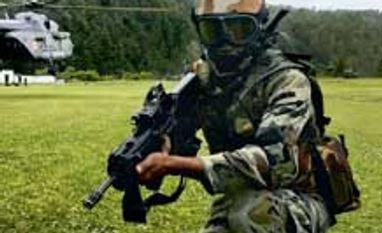The apex Defence Acquisition Council (DAC), which met at New Delhi to clear the purchases, emphatically favoured manufacturing in India, even when clearing the procurement of foreign equipment. A long-running tender for buying 197 light utility helicopters (LuH) from the global market has been scrapped, and re-issued in the "Buy & Make (Indian)" category. This requires Indian companies to build the LuH in India, in collaboration, if necessary, with foreign partners.
"In accordance with the government's policy, this will create manufacturing jobs, benefiting Indian industry to the tune of Rs 40,000 crore", said a MoD official who briefed Business Standard on the outcome of the DAC meeting.
Immediately benefiting from this decision will be public sector aerospace behemoth, Hindustan Aeronautics Ltd (HAL), which has worked for four years on developing an indigenous LuH. In 2010, the ministry of defence (MoD) had split the military's requirement of 384 LuHs into two - with 197 being procured over-the-counter (now cancelled); and HAL assured an order for 187 helicopters, provided this was developed by 2017.
"We appreciate this decision by the government. It is an important step towards indigenising aerospace capabilities," says RK Tyagi, the HAL chief.
HAL's progress on the LuH has been slowed by difficulties in selecting an engine for the helicopter, Defence Minister Arun Jaitley told the Rajya Sabha on August 12.
The emphasis on indigenisation is evident also in the decision to overhaul and refit six of the navy's 13 submarines. The so-called Medium Refit and Life Certificate (MRLC) programme is a two-year process that involves stripping down the submarine, repairing its hull extensively, and replacing worn parts.
The Rs 4,800 crore sanction clears the overhaul of four Russian-origin, Kilo-class, and two German-origin HDW submarines. Of the Kilo-class vessels, two will be refitted in Russia, and the other two in Mumbai naval dockyard. Mazagon Dock Ltd, Mumbai, will overhaul both HDW submarines.
Support to the indigenous Arjun main battle tank (MBT) continues, with the DAC renewing a Rs 6,600 crore clearance for 118 Arjun Mark II tanks. This will equip two army tank regiments, adding to an earlier order for 124 Arjun Mark I tanks.
Further support was extended to the Arjun tank project through the clearance of 40 self-propelled artillery guns, worth Rs 820 crore. This gun system, termed a "catapult", consists of a 130-millimetre gun mounted on a Arjun tank chassis, allowing it to keep up with tank columns and provide them fire support in battle.
The catapult will be developed by the Central Vehicle R&D Establishment in Chennai, and then offered to the army for trials.
In a decision that will please Washington in the run-up to Prime Minister Narendra Modi's visit next month, the DAC cleared offset proposals relating to the purchase of two Boeing helicopters - 22 AH-64E Apache attack helicopters; and 15 Chinook heavy lift helicopters. This removes the last hurdle to signing the two contracts, together estimated to be worth Rs 15,000 crore.
Boeing has declined to comment, but company sources say this is a key step that could allow the contract to be signed by the year-end.
In a clearance critical for the navy's operational readiness, DAC approved the Rs 1,770 crore purchase of Integrated Anti-Submarine Warfare Suites (IADS) for 11 warships - seven frigates being built under Project 17A, and four destroyers being built under Project 15B. As Business Standard first reported (May 16, 2014 "Warships in peril as defence ministry blocks sonar purchase") the MoD had blocked the import of crucial sonars since the late 1990s, rendering 25 major Indian warships, including the INS Kolkata and INS Kamorta, commissioned this month by the prime minister and defence minister respectively - extremely vulnerable to attack by enemy submarines.
The navy will also get a relief, with DAC permitting commercial bids to be opened in the Rs 1,800 crore tender for 16 naval multi-role helicopters, which fly from warships and detect enemy submarines. With one of the two vendors - NHIndustries - part-owned by Finmeccanica, now banned, this has the potential for the other vendor, US company, Sikorsky, to win the contract.
Also cleared was a Rs 900 crore dedicated mobile communications system for army troops deployed in Ladakh and the eastern command. Since border areas are poorly covered by commercial mobile service providers, the army intends to establish its own mobile network all along the borders.
)